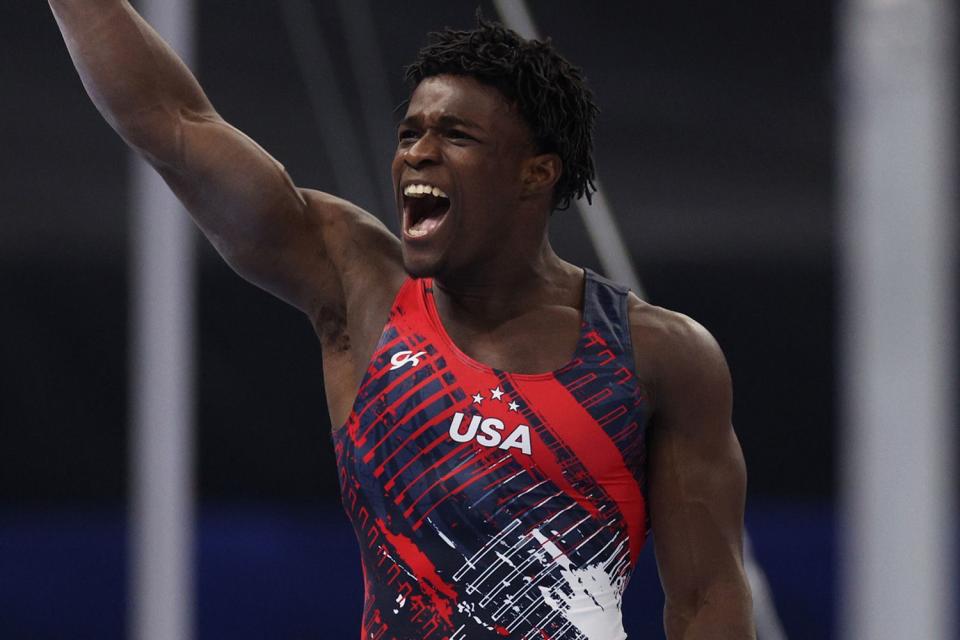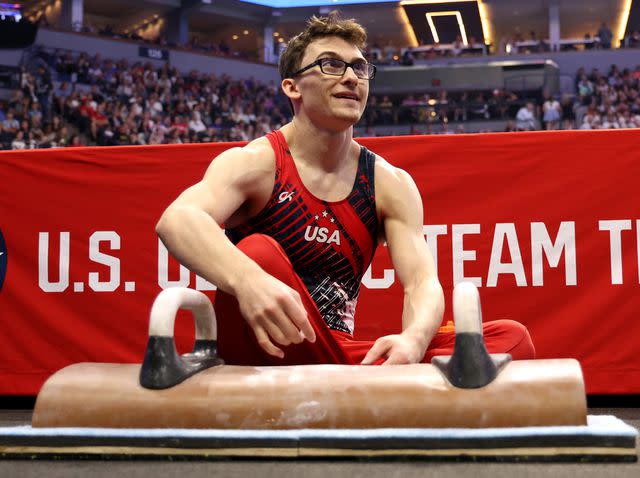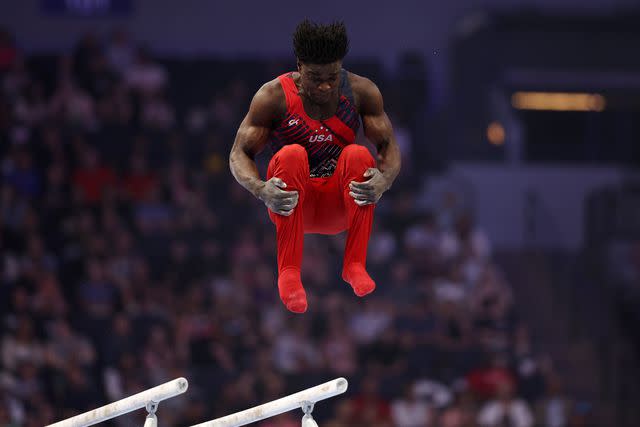Why Team USA's Male Gymnasts Are Pretty Sure They're Going to Win Big, at Last, in Paris
The newly named five athletes open up about what it was like to be picked, how they've prepared and what's ahead

Elsa/Getty
Fred Richard celebrates after competing on the pommel horse on Day 3 of the 2024 U.S. Olympic gymnastics trials on June 29.All the years of effort — the sweat, the stress, the success, the injuries; the certainty, no matter what else, in continuing to compete — ended this way for Stephen Nedoroscik and four of his new fellow Team USA gymnasts:
They were sitting behind a curtain on Saturday, June, 29, waiting to hear the one thing that would change their lives forever. They were going to be Olympians in 2024.
Nedoroscik, a 25-year-old specialist in the pommel horse event, initially tried not to drive himself too crazy. He’d done nearly as well as he could in his signature event. After that, the gymnasts had to remain in limbo for about 30 minutes on Saturday at the end of two days of qualifying.
The rest was waiting.
“Stay in my zone,” Nedoroscik thought. He texted his girlfriend, Tess McCracken, and then all of a sudden the selection committee arrived, paper in hand, with their decision.
“Before I knew it, my name was called and it was just the best moment of my life,” Nedoroscik told reporters afterward, elated.
His reaction was understandable: “I stood up and I said, ‘Holy— bad word,’ and I hugged all of the guys that were mentioned before me. I didn't cry, I'm no good at it. But maybe I will later when it really hits me.”
Never miss a story — sign up for PEOPLE's free daily newsletter to stay up-to-date on the best of what PEOPLE has to offer, from celebrity news to compelling human interest stories.
Paul Juda, who joins Nedoroscik along with Fred Richard, Brody Malone and Asher Hong, remembered that moment this way: “I wish I could say I was calm, cool and collected. I might've been that on the outside, but my heart was just pounding.”
And then.
“I was the first name called, and the second I heard ‘Pa—,’ I started crying right away,” Juda, 22, told reporters.
The five male gymnasts who will represent Team USA at the Paris Olympics starting in July sounded variations on this note — overjoyed, eager, excited, perhaps ready to get a bit of rest in the next few weeks.
If this victory wasn’t everything, then it was still a lot.
“I’m really glad that I wrote on my whiteboard — ‘become an Olympian,’ “ Juda said, breaking down in happy tears. “I had fell short on a couple other goals that I wrote on that whiteboard and I was starting to think if I should erase the one that said Olympian because I guess maybe it won't come true.”
“But I’m going home and I’m putting a massive check mark on there. And I'm glad that it went there, that I kept it there,” he said.

Jamie Squire/Getty
Stephen Nedoroscik prepares to compete on the pommel horse on Day 3 of the 2024 U.S. Olympic gymnastics trials on June 29.Juda will compete alongside another University of Michigan teammate, Richard, who remained seemingly unflappable throughout qualifying, during which he edged out Malone, the reigning national champion.
“I think I was pretty cool on the inside,” Richard, 20, tells PEOPLE. “I think … it's just trusting the process.”
“It's hard to enjoy things when you're stressing,” he adds. “It's easy to enjoy it when you're just being as grateful as possible and taking in the moment.”
Juda sounds happy about what’s ahead for them both, saying, “We're going to have a really good time. Fred pushes me every day and, whether intentionally or not, I'm always trying to match up to what he's doing and he's incredible.”
Richard’s refrain of “trust the process” was shared by some of his teammates. As was their determination — even their promise — that they’ll bring back medals for men’s gymnastics in Paris.
That would end a relative drought period for Team USA's men since 2008, the last time the team made it on the podium for gymnastics. Only three American men have individually medaled during or after 2008; and none did in the most recent Tokyo Games, in 2021.
“We're going to bring a team medal home,” Hong, 20, said on Saturday after trials ended. “That’s the goal. … all along.”
Richard, who is emerging as a face for the squad of U.S. gymnasts, was more emphatic.
“I knew whatever team was chosen is a deadly team, and I stand to say that now that I actually see it — this medal, it's like, we shouldn't be aiming for just a medal. We should be aiming for gold,“ he said. “And we're going to land on something. That's how I feel.”
What changed? In short, U.S. gymnastics officials have been encouraging their athletes through bonus points to up the difficulty of their routines in order to, over time, up their scores on the world stage where they have been outstripped by China, Japan and others.
It paid off: “The push and the drive of this entire national team to build difficulty, to be competitive internationally, has just been incredible and it was spurred by the bonus system,” Malone, 24, tells PEOPLE.
“You have the bonus system — but you have to have the guys who get behind it and have the drive and want to make that push," he says, "and I've seen that with every single person on this national team. So it's been incredible.”

Elsa/Getty
Fred Richard competes on the parallel bars on Day 3 of the 2024 U.S. Olympic gymnastics trials on June 29.Brett McClure, a top-ranking official with USA Gymnastics, agrees. He just didn’t quite think it would pay off so soon.
“That was the whole objective over the last three years, since Tokyo. Honestly [I] didn't think we could do it, it was like maybe this is going to be an L.A. path for change [in 2028] as far as really increasing in difficulty and things like that,” he says. “And they did it in time for Paris, and now here we are getting ready to head over there with a great team.”
The fivesome — plus traveling replacement athletes Shane Wiskus and Khoi Young — have about a month before Paris.
“Now it's just putting our heads together and figuring out where we best fit in as far as our performance and what events we're going to be doing,” Malone says, noting that they are “all super close.” (And then later saying that one area they could all work on is the pommel horse event.)
The new teammates will all find their place, working together, they say.
“I think I can be that solid, consistent guy that — I have that calm, collected attitude, mentality and my gymnastics will show the same thing,” Richard told reporters. “And so if anybody's nervous, I think they can come to me to lighten the mood.”
Said Nedoroscik: “I’m always the guy that kind of helps anchor people down in the competition. I really like to cheer. I really like to keep it goofy. I don't like it when people get super serious.”

Jamie Squire/Getty
Asher Hong competes on the vault routine on Day 3 of the 2024 U.S. Olympic gymnastics trials on June 29.They’ll train, they’ll rest, they’ll celebrate.
“Trust what you're doing,“ Nedoroscik said. “It's working, everything's going to work out in the end.”
Rinse, repeat.
“Train, recover and have fun.” That’s how Hong plans to spend the next month, he tells PEOPLE.
“That's all I can say … I have my eyes set on that team medal, and we're going to go out there and represent our country.”
Richard, bouquet in hand — and a brand-new pair of Nikes on his feet, both courtesy of his victory — is facing forward.
“It's like a new mountain in my life,” he said, “and I'm ready to climb it.”
For more People news, make sure to sign up for our newsletter!
Read the original article on People.

 Yahoo Sports
Yahoo Sports 
